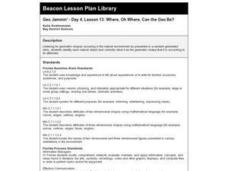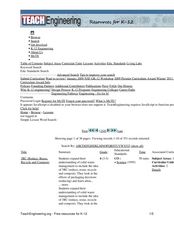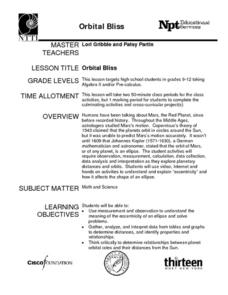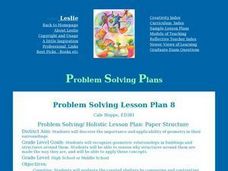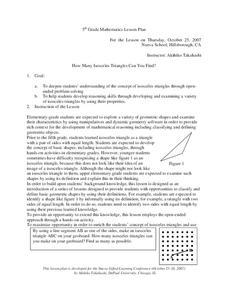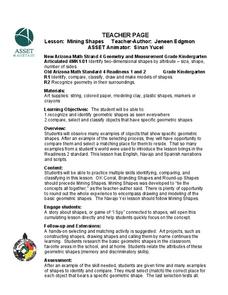Curated OER
Bubble and Boyle
Even middle schoolers still enjoy experimenting with bubbles! They execute a series of experiments enabling them to distinguish between convex and concave surfaces, explore the properties of buoyancy, surface tension, and density,...
Curated OER
Wheeling It In!
Students use everyday materials (milk cartons, water bottles, pencils, straws, candy) to build a small-scale transportation device that incorporates the wheel and axle and the lever. They race their carts/trucks, measure distance, time...
Curated OER
Introduction to Biometrics
Students use the internet to research how biometrics is being used in the real world today. They work together to research hand geometry applications. They share their findings with the class.
Curated OER
Measurements Around the Classroom
Third graders practice measuring items by examining classroom objects. In this geometry lesson plan, 3rd graders utilize measuring tools to find the weight, time, length or temperature of specific classroom items. Students...
Curated OER
Do You Have Number Sense?
Seventh graders are grouped according to their ability level with a captain who is elected by the students in that particular group. Students demonstrate their knowledge of rational and irrational numbers by defining them. Students use a...
Curated OER
Geo Jammin' - Day 4, Lesson 13: Where, Oh Where, Can the Geo Be?
Learners listen to a story "My Crazy Dream" with an intent to identify shapes in ordinary objects. They raise their hands when they've heard an object whose shape they can identify. They discuss their findings.
Teach Engineering
Discovering Relationships Between Side Length and Area
Consider the relationship between side length and area as an input-output function. Scholars create input-output tables for the area of squares to determine an equation in the first installment of a three-part unit. Ditto for the area of...
Curated OER
Symmetry in Children's Art Experiences
Read between the lines of symmetry to make important connections between math, art, culture, and nature.
Curated OER
Let's Move It!
Students create a simple machine that includes a cart and lever system that could have been used to build the ancient pyramids. In this simple machine lesson, students learn about the wheel and the axle as simple machines that help...
Curated OER
Symmetrical Snowflakes
First graders, exploring lines of symmetry, follow directions to create a symmetrical snowflake from their own homemade icing. As a class, they discuss lines of symmetry and determine if specific shapes are symmetrical. After the lesson,...
Curated OER
Orbital Bliss
Most young mathematicians are aware that the planets don’t orbit the sun in a circle but rather as an ellipse, but have never studied this interesting feature. This resource looks at the planetary orbits in more detail and helps learners...
Curated OER
Coordinate Plane
Students use computer applets to demonstrate three dimensional coordinate planes. In this coordinate planes lesson plan, students play a coordinate game and a maze game.
Curated OER
How to Take math Lectures Notes
In this math worksheet, students review the steps they were taught, to take correct notes in their math class. This worksheet can be used to teach students the correct process of note taking for just about any subject. There are 6...
Curated OER
Powerful Pulleys
Young scholars explore the building of a pyramid and how pulleys were used to change the direction of applied force. They demonstrate the mechanical advantage of using a pulley and apply it to modern engineering.
Curated OER
Problem Solving/ Holistic Lesson Plan: Paper Structure
Young scholars observe geometric relationships in buildings and structures. They reason why structures are constructed in a specific way by applying geometric concepts. They construct a shelter using their geometric knowledge.
Curated OER
Perfectly Puzzling Pentominoes
Second graders utilize manipulatives (pentominoes) to demonstrate knowledge of: lines of symmetry, slides, reflections (flips), rotations (turns), area, and perimeter. This instructional activity gives students a meaningful way to...
Curated OER
Significant What?
Students define accuracy and precision, and differentiate between the two terms, apply the concepts of accuracy and precision to a given situation and correctly apply the concept of significant figures to measurement and mathematical...
Curated OER
How to be a Great Navigator!
Students examine historical methods of navigation. They discuss the techniques of "Dead Reckoning," "Heaving the Log," and "Chip Log," pretend to sail from Europe to North America using vectors and determine the location of their...
Curated OER
How many isosceles Triangles Can You Find?
Fifth graders solve problems while examining a variety of isosceles triangles. In this isosceles triangle instructional activity, 5th graders examine shapes to find their characteristics. Students pay particular attention to...
PBS
Arguing over Area
With the help of the Area Officers and Perimeter Patrol, you learners will develop a better understanding of area and its relationship to perimeter. First, they view a video clip from Cyberchase, and then they visit a website to...
Curated OER
Branding Circles, Squares, Rectangles, Triangles
Compare and classify 2-D shapes! Kindergarteners inspect the attributes of plane shapes and examine shapes in everyday life. They label the circles, squares, rectangles, and triangles they find. This is the website where you can find the...
Curated OER
Satellite Tracker
Students use satellite tracking software to monitor different satellites. They predict and graph the motion of the space station. They create a 3-D display of its path and share it with the class.
Curated OER
Watch It Slide!
Students work together to examine inclined planes. They create a plan to raise rocks to build pyramids. They discover the changes that occur when the angle is increased or decreased.
Arizona State University
Mining Shapes
Youngsters recognize and identify shapes. They draw, and use modeling clay to make shapes. They also identify shapes in their environment and in the Navajo culture, then compare the shapes and sort them into groups. This is the...





